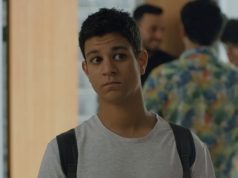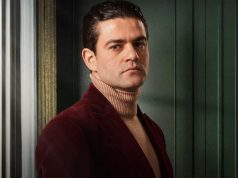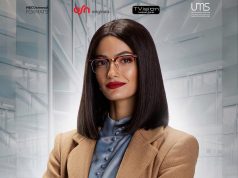Egyptian Film Takes on Supernatural Powers
Interviewed by Shorouk Abbas & Lydia Schoonderbeek
Here is a secret about meeting a celebrity: As much fun as the mystery surrounding their “real” personality is, the best thing is when you meet a star and they are exactly the way you assumed (and hoped) they’d be. Most of the time they were all completely, anticlimactically themselves, and I would have had it no other way.
So when I arrive at the Opera House in Zamalek to interview the director Daoud Abdel Sayed, I am very happy to notice that no one refers to him as anything but “Mr. Abdel Sayed.” That his flinty gaze is powerful, his voice a raspy whisper, and that he is completely in control. Just as it should be.
Daoud Abdel Sayed is remarkably consistent, a prominent component of the Egyptian film industry, and widely respected in the film industry. Four of his films have made the list of ‘Best Top 100 movies ever made in the Arab Film Industry’. Cairo East Magazine gets a chance to sit down and chat with this enigmatic director, one who makes a single film every 4 to 5 years.
CEM: How did the idea of QUODORAT Gheir Adeya come about?
DAS: The film has another meaning; it’s not really about supernatural powers that are non-existent. It’s the notion that we all have a superpower in the form of energy that most of us are not aware of it. We are all souls, which are connected to a realm of energy; if we used it we would have access to bigger things in life. Love is a superpower, and accepting others is a superpower. These concepts need to be brought to people’s awareness.
Art is meant to enhance this, to make people more human. The idea of the movie started very small, and as it grew it took approximately 4 years to write. I hope the audience gets something from this movie, whether it’s a form of entertainment, or more thought later on throughout life.
You maintained your standards in a suffering movie industry, and didn’t give into commercial movie-making. How did you keep your balance?
I don’t see this as maintaining a balance. I see it as having a child who is smaller than it should be for his bed. Would you cut off his legs to make the bed fit? I make some practical adjustments to my work but it’s only shaping it a little bit not amputating it. My family supports me on this, especially my wife who encourages me not to make any compromises.
There are a lot of actors that are really good, how did you cast for QUODORAT Gheir Adeya?
The selection of the actors happens through phases, some of it happens through the writing phase and sometimes at the end. As for the leading roles, we are very thorough with the selection process as it is very rare that we cast the lead role incorrectly.
What don’t you like about your job?
I don’t love or hate my job; I was born to do this. I consider myself a nail in a big machine. I don’t want to be an international film director, for me that’s torture. What more should I want from life. I do my part to the best of my ability but there is a bigger picture, a divine plan. I feel this is where I should be and what I should be doing.
What do you enjoy when you are not working?
I love reading. My best moment is when I wake up and have my coffee and a cigarette. This is the moment I really enjoy.
What is in the pipeline now?
Resalit Hob, which hasn’t begun yet but it’s in the pipeline.
Quick fire round
Which person would like to meet?
Baradeiy, I would like to know his perspective on matters that have unfolded till now in Egypt.
Best quote?
Sheikh Tanoush Garageya, who’s Lebanese, once told me, “Life is a dream that goes by fast.” This is how I feel, to have a life without any regret but with some kind of sorrow. To me life is going by like a dream.
What makes you the happiest?
The little things in life: if I watched a good movie, or if I read a great poem.
Your favorite place to travel to?
Rome, Italy,
What is success?
There are certain things that you can label. Success is that, when a movie I envisage to be a success, does succeed.
What is love?
It’s the cement that puts together rocks. Those rocks are people. Love is my home, Egyptians, it ties everything up. Pure cement!
Abbas Abul Hassan has more fun than any other Egyptian actor. True, he tells Cairo East Magazine, but as a hard-working actor, and scriptwriter he has charmed us all with his latest role in Quodorat Gheir Adeya. Say his name, and you’ll get a mesmerizing smile. He comes across as articulate, upfront and funny in interviews, he certainly has something of a laissez-fair lothario about him.
CEM: What are your thoughts on the character you portray in Quodorat Gheir Adeya?
AH: The movie is about make believe, it’s an illusion of superpowers. My character in the movie is the only character that doesn’t possess or believe he has a superpower.
Tell me about your character in the movie?
My character Omar is the head of the intelligence department in the government, which is a new department created to bring in people with supernatural powers to help the police cross examine its’ suspects. All his life Omar dreamt of doing something great for his country, and is very patriotic. For me this is the first time that I play a character that is very humane. You’re not able to hate this character; he goes through an emotional rollercoaster, which possesses the good and the bad. Working with Daoud Abdel Sayed is an honor. He’s a writer and director, and he wrote this role where Omar is between a devilish and an ambitious character. Daoud is not a conventional director, but he’s classic in his sense of directing, which is what I love about him.
Have you personally had experiences that you consider paranormal?
I was exposed to a supernatural power when I was around 9 years old. I used to go to the countryside as a child, and I had these warts around my hands. I was too frightened to visit the dermatologist, so our housekeeper one weekend whilst at our country house, took me to visit this peasant in the village, who was known for her magical powers. I sat in front of this tiny old lady, and she gave me raw beans (fool), which she placed in 2 groups. She circled the beans around each wart, whilst chanting in a very low voice. She kept rubbing them, and said in 3 days they will be gone. Of course I was skeptical, but the warts did disappear from my hands 3 days later, not even leaving a scar.
Where was the movie shot?
A big part of it was shot in Abou Eir, Alexandria. Daoud loves winter in Alexandria especially Nawwah, therefore we had to wait for this weather and it was very difficult working with gusts of wind and an odd climate. The rest was shot in an amazing house, and balancing the effects of the light sometimes took days before it was right. It took 6 and half weeks in total to shoot the movie over a period of time, but the script was written over 4 years.
What moments stand out in your mind regarding the filming of Quodorat Gheir Adeya?
There was an intimate scene that had to be shot with me in a towel and I was meant to seduce my wife. That’s the scene, which really got me very nervous, as there were a lot of technicalities to be considered so it completely kills the moment of trying to be romantic. You become very mechanical, as you have to consider the lights, angles, and sound, and you have the director telling you don’t touch her hair like that, it should be done this way instead. The set also felt weird, it was like everyone was sitting in classroom observing you!
How did you prepare for this role?
In a very traditional way: I did my homework and I read thoroughly. I researched the character, his triggers and mannerism, and I started building the history. I created a reference, and I studied my dialogue and also the character’s emotional vulnerability. My character Omar has so much dialogue, which I found daunting. But this motivated me to take the part. I hadn’t acted in 5 years as I was focused on scriptwriting. I felt like taking on this role was like walking into the lion’s den. Daoud has a great ability to bring out your innermost self, and he might eventually tone it down or give you a key word. He’s a peaceful director, he wants to bring out the truth.
How do you think Egyptian audiences will react to the film’s theme?
That’s a tough one! See, Daoud has done movies in the past that have been very successful in the box office. His films are very special, he wants to tell a story. He writes and directs the movie without having the audience in mind. I guess we will find out soon how it will be perceived by the audience.
What do you have in the pipeline now?
I’m now working as a scriptwriter on a tough project with Marwan Hamed and Mohamed Hefzy, which we’re in the process of writing. It’s a multinational movie, with several countries involved, and I am also working on 2 other projects.
What do you struggle with as an artist?
Reminding myself everyday of what drives me to write; it’s the excitement and the journey and the flight of creativity. I also struggle with being as solid as Daoud, and how very rare it is to be around year in and year out making movies the way he wants to make them regardless of any industry or commercial pressure.
One can easily struggle between choosing to be in blockbuster films with box-office appeal or making select movies out of pure artistic passion, the price of which could be making a movie every four years.
It’s exactly like when someone decides to be a poet – is it for self-fulfillment or for artistic (commercial?) success? It is art and you become an artist. It’s tough, because you have all this doubt in mind for your next movie. You’re giving your audience a journey, and you pre packaged it in an intelligent way, and your making it fresh. It’s exactly like watching a movie, which stays with you after you’ve watched it. It can stay with you for 6 months or a lifetime. Movies, that stay with you, and you tell your children to watch are successful movies. Keeping up the momentum as an actor is very hard, especially if you don’t want to by type-cast.
Quick Fire Round:
What is your favorite cuisine?
Lebanese
Last movie you’ve watched?
Interstellar, and I slept through most of the movie.
Worst habit?
Hating to answer my phone, I have a problem with phones.
Best Quality?
Truthfulness, boldness, and my straightforwardness.
What makes you laugh?
I make me laugh, I’m quite funny.
Favorite holiday location?
Nepal, I went with 14 people around 10 years ago, and we rented a bus. We had a brilliant time.
Best gift you’ve received?
Recognition.
Success is…..
Doing what you like to do for a living
Making a seamless transition from the world of television to the silver screen is tougher than it looks. But somehow actor Naglaa Badr has got it just right. With her new role in Quodorat Gheir Adeya Badr shows how versatile and talented she is. After a solid run of successful TV series and programs she has firmly established herself as a name we can expect to see more often as the film credits roll. Cairo East Magazine chatted with Badr about her latest venture.
CEM: Why did you choose to take on this role?
NB: I was always interested in super powers in general. I read so many books about telepathy, the power of the subconscious and the power of mind over matter. Any strange phenomena would intrigue me and I always strived to know more about it. I believe we all have superpowers. It’s what some people call instinct; others call strange coincidences. I have always dreamed of working with Mr Dawood Abdel Sayyed. He was actually watching the work of Mr Khairy Beshara. That’s how I was chosen, so I believe this was not a coincidence.
Have you personally had experiences that you consider paranormal?
Again, it is what people might disregard as just a weird coincidence. My phone rang and I told my friend who was sitting next to me, “It’s Nevine!” without looking at my phone. I hadn’t even spoken to or heard from Nevine in 3 months! Another time as I was getting into my car, I had a strong feeling that I would be in an accident. I could even see it. As it happened, I did indeed have a terrible accident that day. I was really scared. Until now I don’t have any explanation for this except that on some level we are all connected.
What moments stand out in your mind regarding the filming of Qudorat Gheir Adeya?
There was a scene when I had to swim in the sea in Abu Keir, Alexandria at 5 am in the morning in the winter. It was freezing! I refused to postpone this scene until the weather got warmer as kindly suggested by Mr Dawood Abdel Sayyed. I wanted to physically feel the cold, not just act it. Strangely enough I felt a surge of power and energy go through my body while I was in the water. However, I suffered from hypothermia for the following 3 days!
What do you have in the pipeline now?
I am working on a program for MBC called Cash or Splash. I am originally a mass communication graduate and I was awarded the prize of best presenter in the Middle East twice.
What’s your struggle as an artist?
The first day of shooting is the worst experience for me. I get so anxious; I practically had to repeat a scene 16 times the first day. Mr Dawood Abdel Sayyed had so much patience and that helped me regain my calm.
Quick Fire Round:
What is your favorite cuisine? Seafood
Last movie you’ve watched? El Feil El Azra’ and El Gezira 2. I loved them both
Worst habit? I forget to drink water and I know it’s bad for my health. I never feel thirsty.
Best Quality? I am a very fair person. I always look for fairness before making any decision. I have the same respect for all human beings regardless of their social or economic status
What makes you laugh? Watching old black and white movies.
Favorite holiday location? Argentina. Latin America in general fascinates me. The culture, the nature and the simple life, It is just what I love. I went to Argentina many times. I stayed there for 8 months one time and practically cried when I was leaving.
Best gift you’ve received? A diamond necklace from someone I do not know and never met. When I received it, I was shocked because it is so expensive.
Success is….. hard work and persistence. I believe in hard work. This is what I know about success.






Comments are closed.